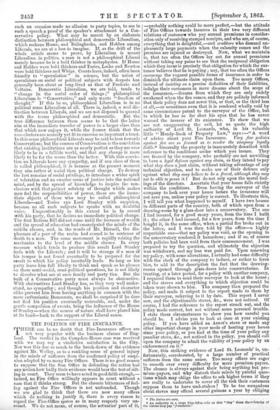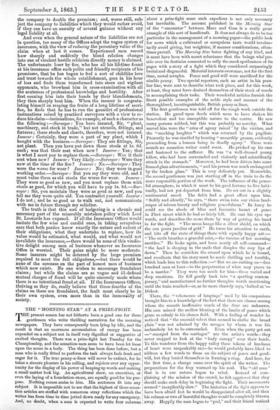THE POLITICS OF FIRE INSURANCE. T HERE can be no doubt
that Fire-Insurance offices are not very popular with the business classes of Eng- land. The verdict in the Campden-House case was received with we may say a vindictive satisfaction in the City. Nor was this due so much to the break-down of the evidence against Mr. Wolley, as to a rankling sense of general injury in the minds of sufferers from the confirmed policy of suspi- cion adopted by so many Fire Offices, There is no good reason to suppose that the Sun Office in defending the action had any notion how badly their evidence would bear the test of sift- ing in court. They seem to have acted in good faith enough,— indeed, no Fire Office willingly appears in court without a case that it thinks strong. But the chronic bitterness of feel- ing against the Fire Offices is not unfounded. Though we are glad to think that there are now many offices which do nothing to justify it, there is every reason to regard the Fire-Office system as in many respects very un- sound. We do not mean, of course, the actuaries' part of it, —probably nothing could be more perfect,—but the attitude of Fire Offices towards insurers in their two very different relations of customers who pay annual premiums in consider- ation only of receiving stamped receipts, and who are, of course, everything that is delightful,—and creditors who demand un- pleasantly large payments when the calamity comes and the premises are injured or destroyed. Now, what we maintain is, that too often the Offices lay out for annual premiums without taking any pains to see that the reciprocal obligation which they incur is precisely that obligation for which the cus- tomer believes that he is paying ; nay, that too often the Offices encourage the vaguest possible forms of insurance in order to diminish the ultimate claim upon them. Too many Offices, instead of insisting on a precise definition of their liabilities, indulge their customers in mere dreams about the scope of the insurance,—dreams from which they are only rudely awakened when the fire comes, and they are politely informed that their policy does not cover this, or that, or the third loss at all,—or sometimes even that it is rendered wholly void by some circumstance patent to the surveyor of the Office, but to which he has so far shut his eyes that he has never warned the insurer of its existence. To show that we are not exaggerating the evil, let us quote the high authority of Lord St. Leonards, who, in his valuable little " Handy-Book of Property Law," says :—" A word of advice about your Fire Insurance. Very few policies against fire are so framed as to render the company legally liable.* Generally the property is inaccurately described with reference to the conditions under which you insure. They are framed by the company, who probably are not unwilling to have a legal defence against any claim, as they intend to pay what they deem a just claim, without taking advantage of any technical objection, and to make use of their defence only against what they may believe to be a fraud, although they may not be able to prove it. j- But do not rely upon the moral feel- ings of the directors. Ascertain that your house falls strictly within the conditions. Even having the surveyor of the company to look over your house before the insurance will not save you, unless your policy is correct. To illustrate this, I will tell you what happened to myself. I have two houses in different parts of the country, both of which open from a drawing-room by a glass-door into a conservatory. The one I had insured, for a good many years, from the time I built it ; the other I had insured, for a few years, from the time I bought it, in the same office, when a partial fire broke out in the latter, and I was then told by the office—a highly respectable one—that my policy was void, as the opening to the conservatory rendered it hazardous ; and if so, of course both policies had been void from their commencement. I was prepared to try the question, and ultimately the objection was withdrawn, and my loss was paid for. Upon renewing my policy, with some alterations, I actually had some difficulty with the clerk of the company to induce, or rather to force him, to add to the description the fact that the drawing- rooms opened through glass-doors into conservatories. In treating, at a later period, for a policy with another company, I required them to send their surveyor to look at the house ; and the stoves and everything to which objection could be taken were shown to him. The company then prepared the policy, and made it subject to the report made to them by their surveyor, referring to it by date. This report I never saw, and the Objectionable stoves, &c., were not noticed. Of course, I had the reference to the report struck out, and the policy made correct, but not without some personal trouble. I state these circumstances to show you how careful you should be. I advise you to look at once at your existing policy. If you have added an Arnot's stove or made any other important change in your mode of heating your house since your policy, or you had at the time of your policy any peculiar stove, &c., not noticed in the policy, you should call upon the company to admit the validity of your policy by an endorsement on it."
Now, this striking evidence of Lord St. Leonards' is, un- fortunately, corroborated, by a large number of practical sufferers from the same cause. Too many offices are eager to smooth over every difficulty for mere premium-payers. The chance is always against their being anything but pre- mium-payers, and why disturb their minds by painful ques- tions which may oblige the office to ask higher terms if they are really to undertake to cover all the risk their customers suppose them to have undertaken ? To be too scrupulous about stoves may offend several guineas a year by obliging
• The Italics are ours.
+ An authority in a large Fire Once tells us that "they" deem three-fourths of the claims they pay "fraudulent."
the company to double the premium ; and, worse still, sub- ject the company to liabilities which they would rather avoid, if they can have an annuity of several guineas without any legal liability at all. And even when the general nature of the liabilities are not in question, too many of the Offices adopt the vague system of
insurance, with the view of reducing the pecuniary value of the claim when at last it comes. Experienced men record how sharply and suddenly the bland relation changes into one of virulent hostile criticism directly money is claimed.
The unfortunate loser by fire, who has all his lifetime found at his insurance office such polite and friendly recipients of his premiums, that he has begun to feel a sort of childlike love and trust towards the whole establishment, goes in his hour of loss and finds them transformed into stern and vigilant
opponents, who browbeat him in cross-examination with all the acuteness of professional knowledge and hostility. After first coaxing him into their hands by their blandishments, they then sharply beat him. When the insurer is congratu- lating himself on reaping the fruits of a long lifetime of sacri- fice, he finds that he has to run the gauntlet of professional insinuations raised by practised surveyors with a view to re- duce his claim—insinuations, for example, of such a character as the following :—Surveyor: You have insured, Sir, " plant, machinery, and stock in trade," but not utensils, fittings, and fixtures; these stools and closets, therefore, were not insured. Insurer : Certainly, they were a part of my plant, which I bought with the business.—Surveyor: They are fittings, Sir, not plant. Then you have put down those stools at ls. 8d. each ; was that their cost when new ? Insurer : Yes ; that is what I must pay to replace them.—Surveyor: Was it their cost when new ? Insurer : Very likely.—Surveyor: Were they new at the time of the fire Insurer : No. Surveyor : They were the worse for wear ? Insurer : No ; they were in good working order.—Surveyor : But you say they were old, and I must value them as old stools the worse for wear. Insurer : They were as good as new, and you trust replace them with stools as good, for which you will have to pay Is. 8d.—Sur- veyor : Sir, you maintain they were as good as new, and you tell me they were quite old. You contradict yourself. Insurer : I do not ; and be so good as to walk out, and communicate with me in future through my solicitor. The truth is that this sort of badgering is a chronic and necessary part of the miserably mistaken policy which Lord St. Leonard's has exposed. If all the Insurance Offices would imitate the few wise and candid ones, in taking scrupulous care that both parties know exactly the nature and extent of their obligations, what they undertake to replace, how its value would be estimated, what would, and what would not invalidate the insurance,,there would be none of this vindic- tive delight among men of business whenever an Insurance Office is worsted. Their gains might. be more moderate. Some insurers might be deterred by the large premium required to meet the full obligations,—but there would be none of the soreness on the part of honest men of business which now exists. No one wishes to encourage fraudulent claims ; but while the claims are so vague and ill-defined mutual charges of fraud will be quite sincerely made where there is no intentional fraud at all. If the Insurances 0 ces, thriving as they do, really believe that three-fourths of the claims on them are fraudulent, the fault must clearly be in their own system, even more than in the immorality of society.































 Previous page
Previous page